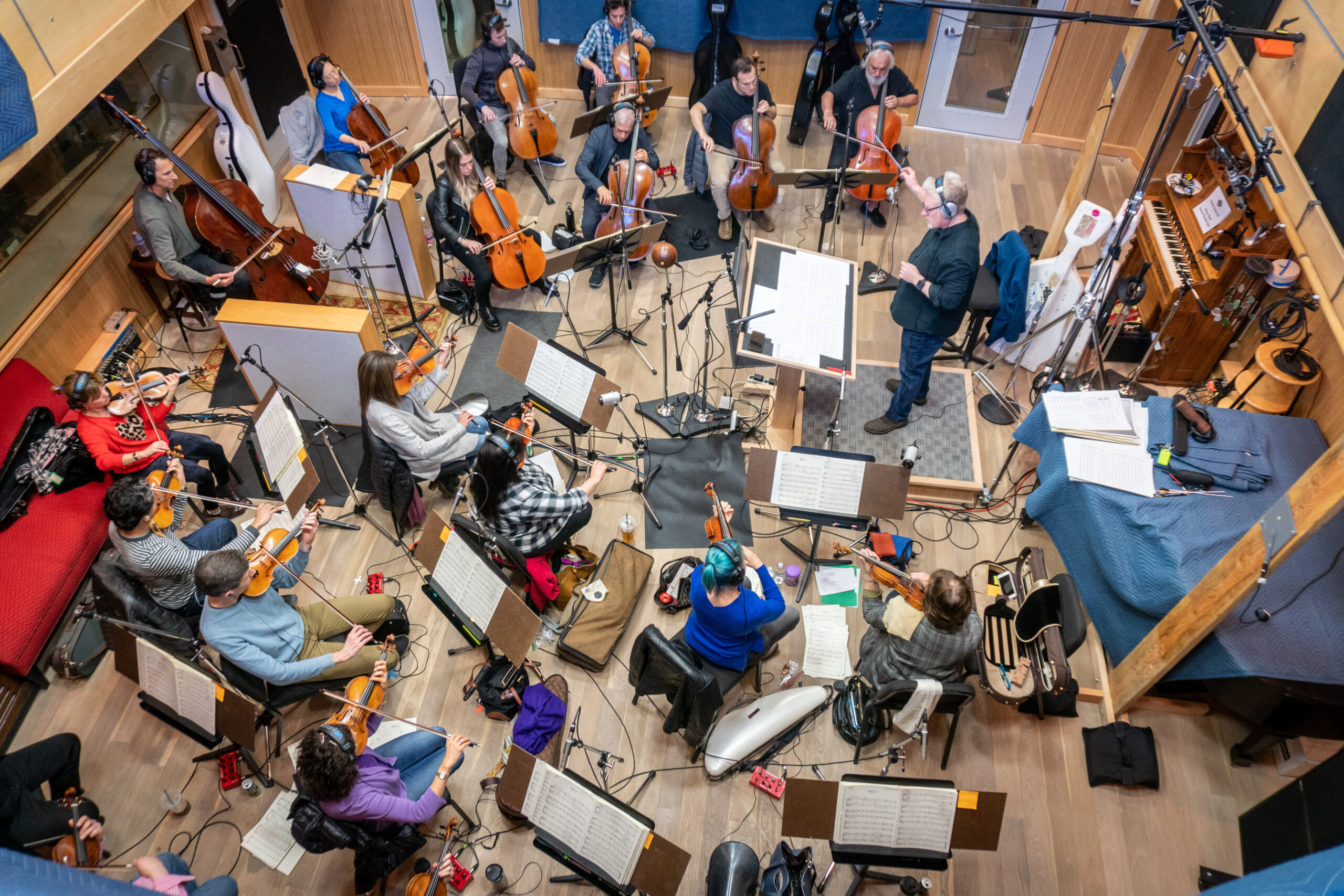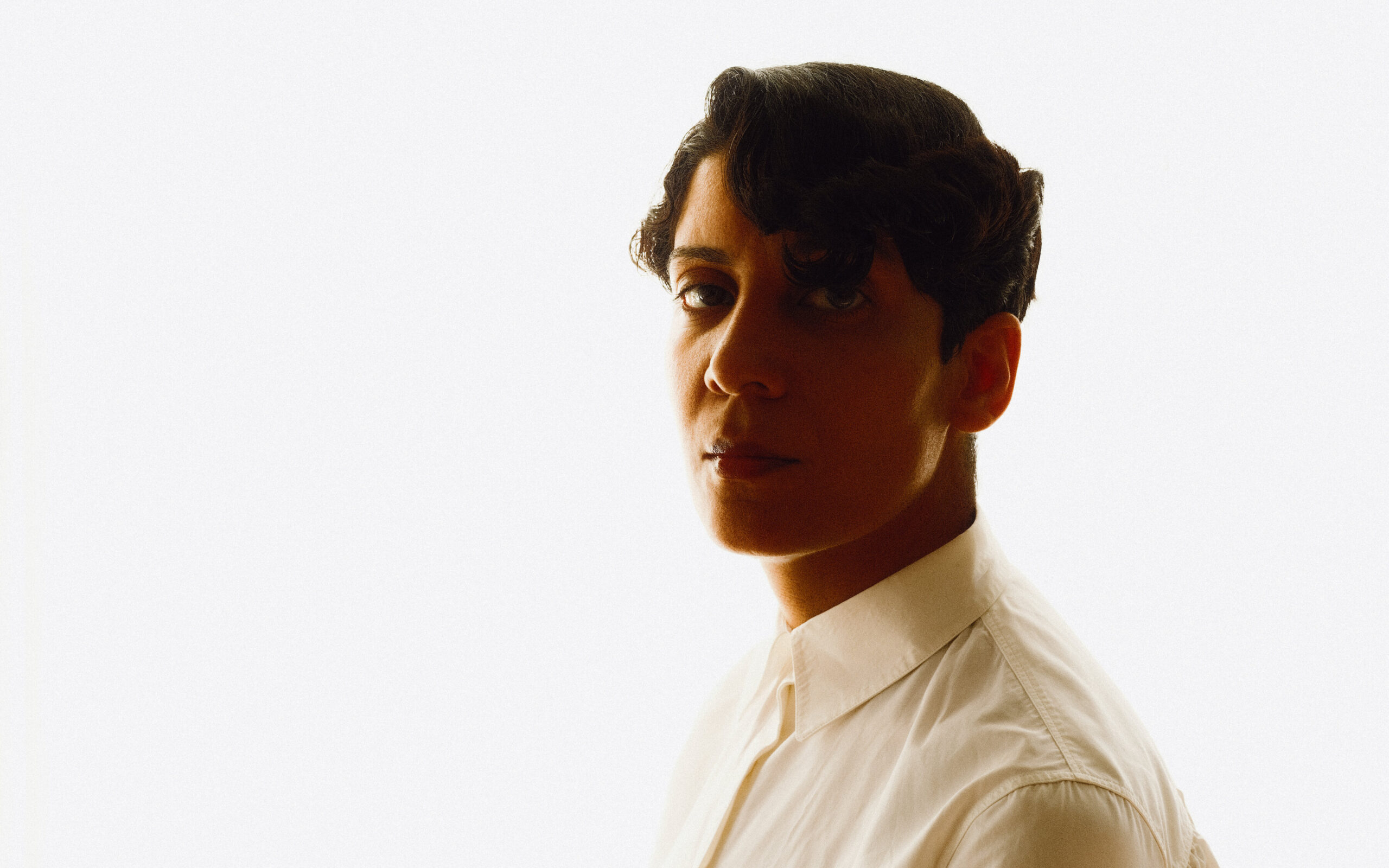Fatima Al Qadiri (Photo by James Kelly)
One of the most unique composers on the world soundtrack stage who’s bringing an eclectic, indie electronic sound to the film medium is Fatima Al Qadiri. Born in Senegal, raised in Kuwait and infused with creativity by diplomat-writer father and artist mother, Al Qadiri went to college in America where she’d get a linguistics degree from New York University. First making musical waves with a mini-mix under the name of Ayshay, Al Qadiri has since scored for art instillations and as an alt. artist with the group Future Brown and such albums as “Asiatisch,” “Brute” and “Medieval Femme.”

(Photo by Lane Stewart)
Al Qadiri’s unique world music sound made its cinematic debut with Mati Diop’s 2019 Dakar-set ghost story “Atlantics.” Mixing women’s issues with exploited workers’ rights for a reincarnation saga with a social consciousness, Al Qadiri’s truly haunting score mixed the country’s rhythmic sounds with the poetry of restless spirits and undying love. Catching adventurous listeners’ ears with the critically acclaimed movie, Al Qadiri next heard the supernatural in Spain with the 2021’s witchcraft infused “The Grandmother.” Now, Al Qadiri’s ethereal approach hears new, American-set dimensions with a tale of two faces linked by the computer for seemingly better and far worse.
The first is Jazmin Jones’ documentary “Seeking Mavis Beacon,” that goes on a quest to find out whom the woman representing a fictional teach-you-to-type icon actually is. The gradual discoveries Jones’ discovers brings out questions of identity and exploitation, leading Al-Qadiri to a playful, yet lyrical sound that evokes the CD-rom beep-boop videogame era from which Mavis sprung, as well as the Haitian sounds from where the real model behind her hails. The second film twists Al Qadiri’s approach when a pornographically doxed email signals a “Skincare” magnate’s paranoid descent to madness. Set in plastic surgery shiny 2000’s-era LA, the harp-inflected gossamer melodies that are all about surface self-love become menacingly percussive and lushly warped melodies, evoking new wave music as much as deliberately candy-colored noir for the cosmetic-obsessed character’s unravelling. Yet whether conjuring modem-inviting rhythms or menacingly satire, both “Seeking Mavis Beacon” and “Skincare” show Fatima Al Qadiri’s singularly transfixing, often dream-like sound that shows her as one of indie music’s most interesting practitioners at translating her sound to a domain in search of fresh voices.

Tell us about your journey through music to becoming a composer?
I wanted to compose for film since adolescence, so starting my music career I prayed for the right director to propose the right film to me…Thankfully it was “Atlantics.”
You caught a lot of people’s attention with the immigrant ghost story of “Atlantics.” It’s rare that you get such an artful supernatural film told from an African angle.
Mati Diop is a detailed and thoughtful director. It was very exciting to work on a film that tackled fantasy and reality in a West African setting.

How did “Skincare” come your way? And once you got it, did you look into the story that it was based on. If so, what was your reaction to it and how did it influence your approach?
Austin approached me for a meeting and we instantly had a rapport. The score had to be finished in a month, so I didn’t have much time to dig into the story it was based on but rather reacted to the film itself and Elizabeth Banks amazing performance.
What was your collaboration with narrative debuting music-centric director Austin Peters like?
I think that when you’re coming from a music video background you’re a music nerd or lover at least, and our collaboration was so much fun and easy going, he trusted my vision.
 Tell us about how you created the sound of “Skincare” and the score’s themes.
Tell us about how you created the sound of “Skincare” and the score’s themes.
Austin positioned his film as a “sunshine noir” that was heavily based in the dark side of the wellness industry, and specifically asked to make the first half of the score more acoustic and the latter more electronic to reflect the shift.
How did you see, and want to play Hope’s character and what’s essentially the fantasy of youth that she’s selling at the start of the film?
To me Hope is a harp, a high femme instrument that is delicate and seductive. And “Hope’s Theme” bookends the film, which is a fragile harp melody that becomes darker and more desperate as the film progresses.

There’s definitely a level of satiric irony and black humor to the film, but one that’s careful not to descend into absurdity. How did you want the music to keep that similar balance? And in a way, do you think the score is counterpoint to the film?
The score is Hope’s internal reality and outer presentation to the world. I wanted the music to outwardly project her mind at all times.
While “Skincare” might not be “body horror” as such, it certainly deals with the very real terror of women being sexually dox’d to the point of having malicious strangers show up at one’s door. How did you want to capture that?
The scenes of doxing and home invasion are terrifying and the most “horror” sounding in the score. The synth I used sounded to me like a melodic off-the-hook dial tone, which is eerily familiar.
How did you want to suspensefully reflect Hope’s journey into catastrophic paranoia?
As the film progresses, the music becomes darker and fully electronic with what I call “screaming” synths and propulsive bass.

Had you ever heard of Mavis Beacon before doing the documentary?
No, Mavis Beacon did not exist in Kuwait where I grew up.
What was your collaboration like with filmmaker Jazmin Jones, who has far more emotionally invested as a first-time documentarian than another director might with a narrative subject?
This was definitely her baby, but it also was a very chill and cute collab. She’s so sweet and we vibed with each other.

In the way that the people here relate to Mavis, did you have any iconic person who inspired you, or a fictional character for that matter?
I have a lot of inspirations. They are mostly non-Western.
How did you want to get across the idea of the internet, and a computer search for a “person” who’s been around since the days of the CD-rom? In that respect, did you want to go for a retro computer sound as well?
Exactly, I wanted to create something that was in between 8-bit video game and digital emulation. I’m a child of the 80s, so I played 8-bit video games and really love their sound.
![]()
Tell us about hearing the Haitian origin of the model who played Mavis?
It was interesting because Jazmin wanted to reference Haiti in the score, and I had a track from 2011 called “Hip hop spa” which has Caribbean steel drums which she was a fan of and suggested that I use steel drums in the score as a main instrument as a way of creating a tangential bridge to Haiti without being overly folk music about it.
“Mavis” takes a light-hearted approach to a very serious subject about computer identity “theft” as such, and its power to create unintended avatars – while at the same time showing the positive effect of its typewriting program and an empowering black woman figurehead. How did you want to play both sides of that?
There’s moments in the score that are very melancholy and reflect the heart-breaking reality of technology and capitalism. And there’s moments that are brimming with a gentle innocence.

Director Jazmin Jones

Olivia Mackayla Ross
“Mavis” often spins off the subject to talk about black female identity as a whole. Tell us about that musical angle.
To me the score is inspired by Olivia Mackayla Ross, Jazmin Jones’ collaborator in the film. She turns 21 in the film, and I felt her genius and personality were especially inspiring to me to create music that sounded innocent, 8-bit and full of longing.
How has musical technology impacted your sound. And what do you think about AI’s impact on scoring?
I never was an acoustic musician. I started composing on analog keyboards and progressed to midi keyboards, using VST’s and DAWs. I do feel like creativity in general is both enhanced and threatened by AI because AI trains and rips off artists’ work. It is imitation machine learning.

What’s ahead for you, and what kind of projects would you like to get, as well as sounds you’d like to explore?
I’d love to score a queer romance and a sci-fi film. But my biggest passion is non-Western film. I would love to be known as the foreign film composer. Having worked on two films where I didn’t speak the language, I know it’s my favorite kind of project. I love responding instinctually to what’s happening onscreen.
Watch “Seeking Mavis Beacon” in theaters now, with Fatima Al Qadiri’s score on Milan Records HERE. See “Skincare” soon on VOD, with Fatima’s score on Milan Records HERE. Visit Fatima’s website HERE
Special thanks to Jamie Bertel at Sony Music


